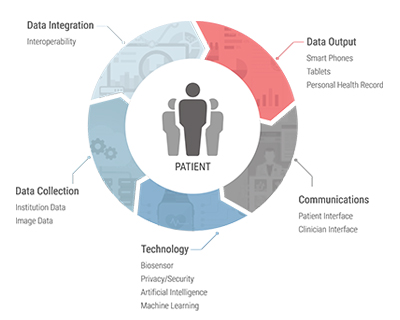Feature: Leading the way in digital health

By Emily Leighton, MA'13
Dr. Anthony Tang envisions a not-so-distant future where sensors, voice recognition, cloud-computing and data analytics are a routine part of our health care experience.
“The grand vision is that we can make a diagnosis, follow a patient’s progress and allow management to occur wherever they are,” said Tang. “This is about empowering patients in their own health care.”
As the Scientific Director and CEO of the Cardiac Arrhythmia Network of Canada (CANet) housed at Western University, Tang is focused on innovative solutions to help patients manage complex medical conditions.
 Collaborating with investigators across the country, CANet is leading the expansion, testing and clinical integration of a digital health platform called VIRTUES (Virtual Integrated Reliable Transformative User-Driven E-health System).
Collaborating with investigators across the country, CANet is leading the expansion, testing and clinical integration of a digital health platform called VIRTUES (Virtual Integrated Reliable Transformative User-Driven E-health System).
VIRTUES delivers efficient, effective and accessible health care, on-demand and tailored to the specific needs of each patient. It provides patients with a patient-owned, cloud-based solution that integrates symptoms, remote monitoring data, and historic health data. VIRTUES outputs the integrated data into personalized recommendations for the management of complex conditions.
The platform is a centralized and highly versatile digital health solution which can accommodate a variety of complex conditions and patient populations. Importantly, VIRTUES is not a telehealth tool or app; it is a disruptive innovation in health care, including the use of modern biosensor technologies to monitor and manage patients with complex conditions.
The project is putting CANet on the map as a leader in digital health. “This is the future of health care and what we have developed is uniquely addressing the patient needs,” said Tang. “We have the potential to be an international leader in this field.”
The VIRTUES platform is addressing gaps in electronic record-sharing that often result in silos and inefficiencies. It also enables remote monitoring and improves access to care for patients in rural and remote regions. This model of health care reduces costs and maximizes delivery efficiency so that quality care can be delivered closer to home.
 One of the major goals for the platform is to influence the management of health conditions and provide direct feedback to patients based on their personal health data. “We want to create a feedback loop,” explained Tang. “VIRTUES provides patients and health care providers with a management plan of expert recommendations, along with educational materials that address the individual’s needs.”
One of the major goals for the platform is to influence the management of health conditions and provide direct feedback to patients based on their personal health data. “We want to create a feedback loop,” explained Tang. “VIRTUES provides patients and health care providers with a management plan of expert recommendations, along with educational materials that address the individual’s needs.”
CANet investigators first initiated the development of the VIRTUES platform for patients with implantable pacemakers or defibrillators, to be able to remotely monitor the devices and collect up-to-date patient information. They were then able to advise patients how the device was performing and if follow-up care was needed.
“The volume of patients with pacemakers in Canada is very big, and there are hidden costs associated with travel and time off work to see specialists,” said Tang. “If we can do things remotely, we avoid about 80 per cent of unnecessary visits. We’re also able to reassure patients much quicker and if there are problems, we can tweak things remotely or ask the patient to come in.”
When the COVID-19 pandemic hit, the CANet team quickly responded, offering the technology to help monitor patients newly diagnosed with the virus as they isolate at home.
Partnering with several health units across Ontario, patients are given a pulse oximeter and access to the VIRTUES platform to track their blood oxygen levels and other vitals. The platform prompts patients twice per day to enter the required information.
“We aren’t able to follow-up with every patient through the VIRTUES platform every single day, so VIRTUES allows us to continue monitoring patients and make sure they are recovering,” said Dr. Marko Mrkobrada, an associate professor at Schulich Medicine & Dentistry and general internist at London Health Sciences Centre who helped develop the hospital’s virtual care model for COVID-19 patients. “It ensures we can monitor patient progress in a very efficient way.”
Using the data available through VIRTUES, doctors and nurses assign a green, yellow or red flag to each patient, quickly identifying those who need a follow-up call or more urgent attention. If a patient is triaged to come to the hospital, the process is streamlined, and care teams are prepared in advance.
“COVID has shown us the possibilities for this type of virtual care – that it can play a role in making health care more efficient and accessible,” said Mrkobrada.
One of the most innovative aspects of VIRTUES is the involvement of patients, who co-developed the concept and continue to contribute to the research.
“There are big companies in the digital health space, but it’s often more about the needs of clinics and care providers, not the patients,” said Tang. “We took the opposite approach and asked about the needs of the patients as a primary objective.”
By entering symptoms and vitals, patients are also participating in their own care.
The CANet team is now enhancing the platform to support the management of patients with atrial fibrillation, heart failure or coronary artery disease after a heart attack. Investigators are also working on voice recognition to analyze coughs, identify stress or depression and recognize breathing patterns.
“Technology like VIRTUES is not just an interesting tool, it’s an inevitable evolution of our health care system,” said Mrkobrada. “There is a huge opportunity for CANet and Western in leading this and collaborating nationally. There is great possibility moving forward.”









